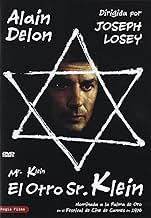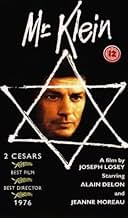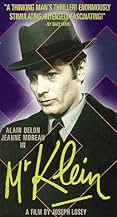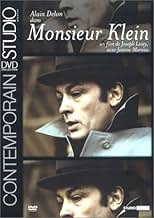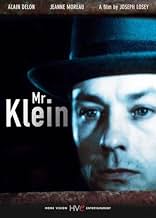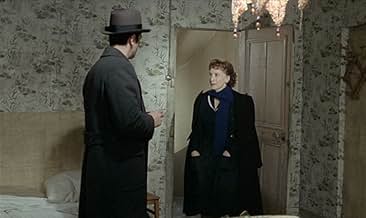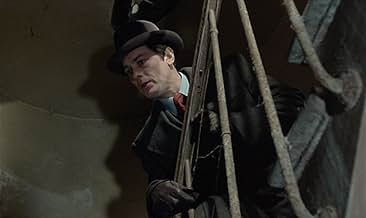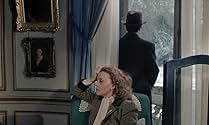Der unmoralische Kunsthändler Robert Klein führt ein Leben im Luxus, bis eine Kopie einer jüdischen Zeitung die Polizei auf ihn aufmerksam macht und ihn mit einem mysteriösen Doppelgänger in... Alles lesenDer unmoralische Kunsthändler Robert Klein führt ein Leben im Luxus, bis eine Kopie einer jüdischen Zeitung die Polizei auf ihn aufmerksam macht und ihn mit einem mysteriösen Doppelgänger in Verbindung bringt.Der unmoralische Kunsthändler Robert Klein führt ein Leben im Luxus, bis eine Kopie einer jüdischen Zeitung die Polizei auf ihn aufmerksam macht und ihn mit einem mysteriösen Doppelgänger in Verbindung bringt.
- Regie
- Drehbuch
- Hauptbesetzung
- Auszeichnungen
- 3 Gewinne & 6 Nominierungen insgesamt
- Nicole
- (as Francine Berge)
- Pierre
- (as Michel Lonsdale)
- Lola - la danseuse
- (as Magali Clement)
Empfohlene Bewertungen
The story takes place in German-occupied Paris in the winter of 1942. Robert Klein (Alain Delon) is an art dealer who leads a comfortable life by taking advantage of the opportunity to buy at low prices paintings from the collections of Jews who were forbidden to practice their professions or trades and who had to sell household objects, including art, in order to survive. The ambiguity of his Alsatian name puts him in an awkward position when he is mistaken for another, Jewish, Robert Klein and begins to receive the newspaper of the Jewish community. Being a Jew in occupied Paris was more than a social stigma, and in trying to clarify the situation, Mr. Klein became entangled in the intricacies of the Petain regime's bureaucracy. The search for his alter-ego becomes a kind of police intrigue in a world that has become absurd according to the criteria of logic and legality that he had known until then. Gradually, he begins to open his eyes to the extent of the discrimination suffered by the Jews and which he had taken advantage of until then nonchalantly. Trying to prove his own 'national purity', Mr Klein starts to get closer the other Robert Klein, who had endangered, intentionally or unintentionally, his easy existence until then. The two Robert Kleins never meet but their destinies are linked.
The quality of Joseph Losey's film-making is remarkable. Paris under occupation, decadent and indifferent, in which part of the population had adopted the slogans, policies and racial legislation of the occupiers and had become complicit in persecutions and deportations denying the democratic principles of France, is brought to the screen with authenticity and carelessness. Attentive as always to detail, Losey creates various interior sets, from the hero's sophisticated apartment or residence in a castle of the probable mistress of the other Robert Klein to his rented, miserable and rat-infested house or the corridors of the police prefectures. The streets are deserted, cold, hostile and if vehicles appear they are police or Gestapo cars. Music plays an important role in two key scenes, one taking place in the castle, the other in a cabaret. The sound of the phones is as threatening as in Hitchcock's movies. Last but not least, the final scene is probably the first on-screen rendition in a feature film of the arrests and deportations of the Paris Jews from the Winter Velodrome, a historical episode kept under silence until then, which many French would have preferred to forget. Alain Delon builds his role between nonchalance and defiance, between trying to ignore realities and assuming them. Among the actors in the cast, I must also mention Jeanne Moreau and Michael Lonsdale, two formidable actors who are cast here in consistent supporting roles. The ending is debatable and was debated, open to many interpretations that have not, I think, been definitively settled by this day. IMDB mentions that Costa-Gavras also contributed to the script, although he is not listed in the credits. 'Mr. Klein' is a must-see film about occupied France and the attitude of the French towards the Holocaust, a film worth seeing, thinking about and discussing.
Robert Klein is man buying art work at severely reduced prices from desperate Jews, and for him, it's just business. When he receives a Jewish newspaper addressed to him, however, he becomes concerned, less he be suspected of being Jewish himself. His investigation leads him to another Robert Klein, who lived in reduced circumstances, supposedly resembles him, and whose new address has been given as Klein's own.
This is a fascinating film about how, in the end, we all become victims of prevailing injustice. There is a great deal of symbolism throughout; Delon's Klein becomes obsessed with the other Klein, and their lives become inextricably entangled.
After this film, you'll be left with many questions, for which there are probably several answers. Thus is the beauty of "Mr. Klein," a wonderfully directed and acted film. Delon, as an arrogant and confused man, has rarely been better. He is one actor who, due partially to a nice long life, has been able to extend his range beyond staggering good looks and play interesting, challenging characters; he is a producer of this film.
This is highly recommended and certainly a credit to the filmmaking skills of Joseph Losey as well as the taste and talent of Alain Delon.
Thanks for reading.
Resume:
First watch: 2021 / How many: 1 / Source: DVD / Rating: 9
Lady Moreau and Francine Bergé could have had more "character development", while beautiful leggy Juliet Berto's long figure and erratic behaviour is all we can see from Bob's fiancé. Robert is cold, intelligent, self assured, able to answer like a French writer while his house is being requisitioned by the police. Lonsdale, from many Buñuel films, gives us the eerie feeling so necessary for this film to succeed. Jugnot and Aumont deliver in their smaller roles. Suzanne Flon, from "Un crime au paradis" among others, is convincing in her obfuscated part.
Gerry Fisher's cinematography and Egisto Macchi's score make this film stand apart, you've get the feeling of "really being there". In the grim and everyday aspects, not fictionalized for being palatable. mackjay from IMDb writes: "Klein's mixture of desperation and arrogance with so much conviction, it's easy to forget he is, after all, acting". C. Tashiro adds that the Nazi horrors are taken for granted, making them more real. Like J. L. Borges usually quipped: "There are no camels in the 1001 nights" meaning those involved don't notice what we, the viewers, probably would.
Franco Solinas's script conveys paranoia as faced by somebody who seems never to have suffered for anything, nor anybody for that matter.
Great film, but obviously, not "light viewing". Maybe a tad slow for nowadays's viewers.
Gripping!!
Alain Delon's Top 10 Films, Ranked
Alain Delon's Top 10 Films, Ranked
Wusstest du schon
- WissenswertesThis was originally going ahead as a Costa Gavras project in 1974.
- Zitate
Le vendeur: Six hundred louis.
Mr. Robert Klein: Three hundred.
Le vendeur: You must be joking. At that price, I'd rather keep it.
Mr. Robert Klein: As you wish.
Le vendeur: It's easy for you, when a man is forced to sell.
Mr. Robert Klein: But I'm not forced to buy. I'm not a collector. For me it's just a job.
Le vendeur: Make me a reasonable offer.
Mr. Robert Klein: Three hundred.
- VerbindungenFeatured in Les rendez-vous du dimanche: Folge vom 6. März 1977 (1977)
Top-Auswahl
- How long is Mr. Klein?Powered by Alexa
Details
- Erscheinungsdatum
- Herkunftsländer
- Sprache
- Auch bekannt als
- Mr. Klein
- Drehorte
- Brasserie La Coupole - 102 Boulevard Montparnasse, Paris 14, Paris, Frankreich(Mr Klein called by the bellboy)
- Produktionsfirmen
- Weitere beteiligte Unternehmen bei IMDbPro anzeigen
Box Office
- Budget
- 3.500.000 $ (geschätzt)
- Bruttoertrag in den USA und Kanada
- 213.769 $
- Eröffnungswochenende in den USA und in Kanada
- 15.915 $
- 8. Sept. 2019
- Weltweiter Bruttoertrag
- 219.070 $
- Laufzeit2 Stunden 3 Minuten
- Sound-Mix
- Seitenverhältnis
- 1.66 : 1
Zu dieser Seite beitragen




